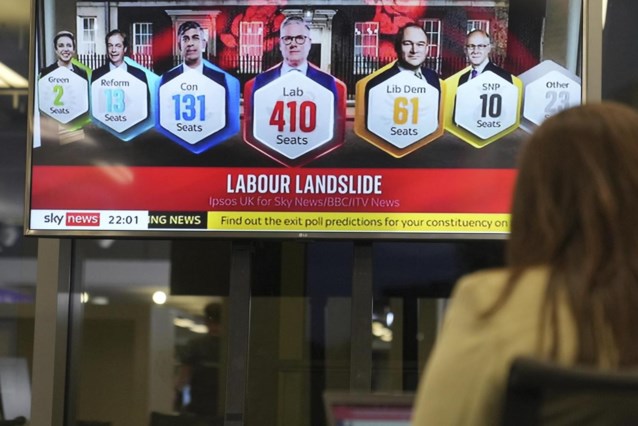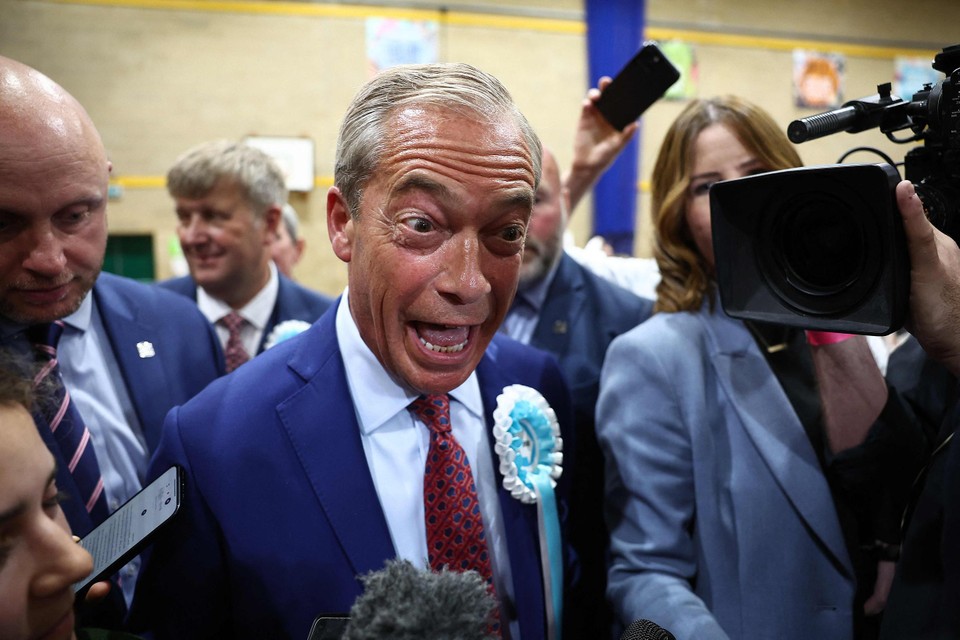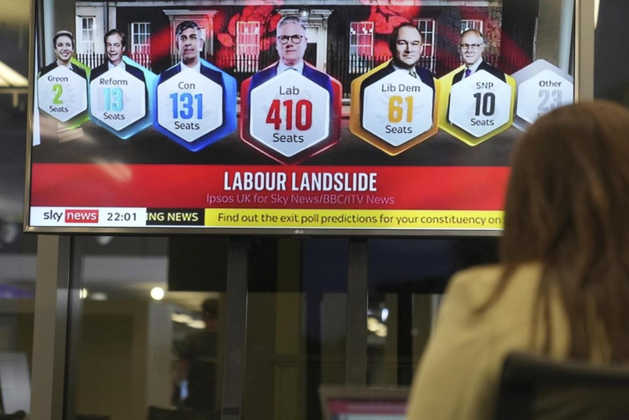According to BBC estimates, based on exit polls and partial results, Labour will convincingly win the UK parliamentary election. Keir Starmer’s party could claim 405 of the 650 seats in parliament. Prime Minister Rishi Sunak’s Conservatives are trailing by a considerable distance and have dropped to 154 seats.
Nigel Farage was elected to the UK Parliament for the first time, but his party won fewer seats than expected. Although an Ipsos poll conducted by major British media outlets and published around 10pm predicted 13 seats for Farage’s Reform UK, the BBC has now adjusted it to just 4.
The new forecasts show a less clear outcome for all parties: after exit polls, Labour was expected to win 410 seats, the Conservatives only 131 seats, and the Liberal Democrats 61 seats. According to the new forecasts, the latter party will remain stuck at 56 seats. .
For Labor The 405-seat forecast would still be the best election result since 2001. They then won 412 seats in the British Parliament with Tony Blair. In 2019, the Social Democrats achieved their worst result, with 202 seats.
Estimated 154 seats for Conservative Prime Minister Rishi Sunak still lost badly and it was the party’s lowest number of seats ever. The Conservatives have never won fewer than 156 seats, The Guardian reports. That result stretches back to 1906.
In 2019, the Conservative Party won a resounding victory with Boris Johnson winning 365 seats, but the party has lost all praise in recent years due to a series of scandals and bad policies. (Read more below the photo)
© AFP
That Liberal Democrats is expected to rise from 11 to 56 seats and once again become the third party in Britain. The traditionally pro-European social liberals have often been the third party in Britain in recent decades and entered a coalition government with the Conservatives under Prime Minister David Cameron in 2010. They have since slumped, with a historically poor result in 2019. Under Ed Davey, the Liberal Democrats have again enjoyed success in local elections in recent years.
Estimates are that 4 seats support English ReformationNigel Farage’s new anti-immigration party, far short of the 13 votes given by exit polls, and short of the 5 to 7 expected by previous polls. Reform UK had initially looked set to be the fourth party in a row. If it were to make it to Westminster, it would now be fifth in terms of seats.
The UK electoral system – the candidate with the most votes in a constituency wins the seat – makes it difficult for smaller parties to win seats. Based on the results of the first constituency vote count, it is surprising that Reform UK candidates often come in second. In terms of total votes, Reform UK can even beat the Conservatives, although this does not necessarily translate into more seats.
Reform UK has been around since 2021 and is a rebirth of the Brexit Party that emerged from the UK Independence Party, the party that made Nigel Farage famous. The latter announced in early June that he would take part in the UK election, despite having been politically inactive for several years. The party has campaigned mainly on migration issues, and could therefore be detrimental to the Conservative Party: Prime Minister Rishi Sunak’s Conservatives have failed to curb illegal migration across the English Channel in recent years.
That Scottish National Party (SNP) According to BBC estimates, it will drop from 48 seats in 2019 to 6 seats now, even worse than the 10 seats predicted by exit polls. (Read more below the photo)
Scenes of joy in London. — © REUTERS
How do individual candidates perform?
The actual results per constituency will be received in the evening. The first results already show that the Labor leader Keir Karmer was re-elected in his constituency of Holborn and St Pancras (London), although his margin was halved compared to 2019. Independent candidate, pro-Palestinian activist Andrew Feinstein, came in second. In many countries where Muslims make up more than 10 percent of the population, Labour is losing ground. (Read more below the photo)
Future Prime Minister Karmer shakes hands with his opponent Elmo Smith. — ©AP
In Leicester South there is a Labour MP Jonathan Ashworth even losing its seat to an independent. The constituency is a Labour stronghold but is one of 16 seats that Labour fears it could lose due to controversy over its position on the Gaza conflict. In the area around Leicester, less than a third of voters are Muslim. Labour leader Keir Starmer has been widely criticised for rejecting a motion for an immediate ceasefire in Gaza late last year and for continuing to reaffirm Israel’s right to defend itself.
Former Labor Party leader Jeremy Corbynwho was expelled from the party, has been re-elected as an independent candidate in Islington North, far ahead of the Labour candidate.
The outgoing Prime Minister Sunak Receiptwas able to retain his seat as expected in the districts of Richmond and Northallerton.
However, some of his ministers were not re-elected. Secretary of State for Justice Alex Chalk and the Minister of Education Gillian Keegan was defeated in his constituency by the Liberal Democratic Party candidate. Minister of State for Defense Shapps Grant and the Secretary of Veterans Affairs Johnny Mercer then had to hand over their seats to the Labor Party. Minister of Culture Lucy Frazer also not elected. Also the Conservative leader in the House of Commons Penny Mordaunt lost his seat to the Labour Party. However, he was mentioned as the strongest candidate to succeed Rishi Sunak as party leader.
Former Deputy Prime Minister under Liz Truss and former Minister Theresia Coffee also had to hand over his seat to the Labor Party, just like the former Foreign Minister Jacob Rees-Mogg.
According to the exit poll, the Minister of Finance Jeremy hunting also lost, but after the vote count was carried out, it turned out that he was finally able to retain his seat by a small margin of 900 votes.
Also former Minister of Home Affairs Suella Braverman able to retain his seat, just like the party chairman Richard Holden. His victory (with 12,905 votes) was only a margin of 20 votes, as revealed after several recounts.
In Clacton-on-Sea is Nigel Farage was elected to the British Parliament for the first time after seven previous unsuccessful attempts, with 21,225 votes. He beat the Conservative candidate by 8,405 votes. The seat fell decisively to the Tories in 2019, but was won in 2015 by Farage’s former party, UKIP.
Farage previously sat in the European Parliament, from 1999 to 2020. This was expressed by Eurosceptics when he compared the then President of the European Council Herman Van Rompuy to a wet mop. (Read more below the photo)
Nigel Farage. — © AFP
The British Reformation also officially won the district seat of Ashfield: Lee Andersonformer deputy leader of the Conservative Party, won the battle.
Anderson was also elected in the district five years ago, but then as a Conservative. However, in late February he was suspended as an MP by the Conservatives after he told the ultra-conservative GB News TV channel that Islamists had “taken control” of Sadiq Khan, the Labour mayor of London. In March he moved to Reform UK.
Reform UK has taken the third and fourth official seats from the Conservatives in Great Yarmouth and Boston and Skegness. He won in the latter constituency Richard Ticeformer leader of the English Reformation.

“Hipster-friendly creator. Music guru. Proud student. Bacon buff. Avid web lover. Social media specialist. Gamer.”










